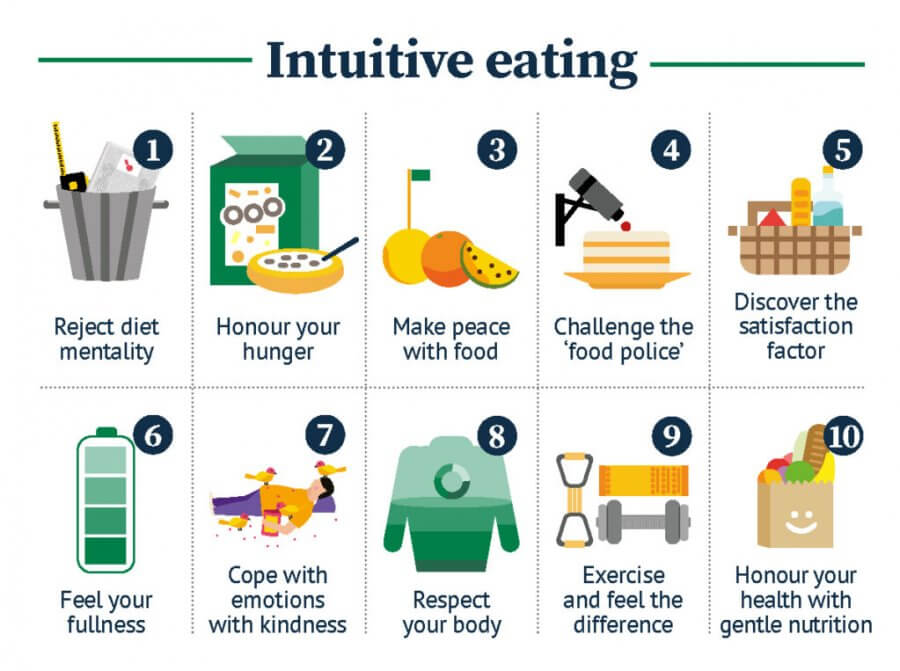Does Intuitive Eating Work For Runners?

Intuitive eating pushes you to forget everything you have ever learned about diet, when and how to eat. Instead of focusing on certain foods as good or bad, you need to approach food completely differently. Encouraged to listen to your body regarding when, what and how much to eat, intuitive eating is different than anything you have ever experienced.
What Exactly is Intuitive Eating?
Guided by 10 core principles, intuitive eating is a philosophy that rejects everything we have learned about how to eat. A rejection of traditional dieting, intuitive eating encourages you to listen to your body’s cues. These cues tell you what, when and how much to eat.
For those of us who have had it hammered into our heads that some foods are good and others are bad, this method of eating requires a clear shift in mindset.
Forget calorie counting or restricting your food intake and allow yourself to enjoy food (and eating) again. While it is not meant to be a method of weight loss, the fact remains that for some people, it does have that result.
What Are the Principles of Intuitive Eating?
There are 10 core values to intuitive eating:
- Reject the Diet Mentality
- Honor Your Hunger
- Make Peace with Food
- Challenge the Food Police
- Respect Your Fullness
- Discover the Satisfaction Factor
- Honor Your Feelings Without Food
- Respect Your Body
- Exercise & Feel the Difference
- Honor Your Health
Rejecting the Diet Mentality
In order to help get yourself in a healthy relationship with food, you need to do a few things starting with rejecting the diet mentality. Many of us have been on that yo-yo diet rollercoaster. You gain weight. You lose weight. You gain it again.
It is a never-ending cycle. Couple that with the idea that some food is good and other food is bad.

When you are on a diet, you start to get a mindset that certain foods are off-limits. In intuitive eating, you are encouraged to make your peace with food. Food is many things. It is the fuel that keeps our body going. It is also a pleasurable experience if you are eating something you really enjoy.
Food itself is not good or bad. It is how we approach it that brings about a negative connotation (or a bad experience with food). If you think you can’t have chocolate cake, then you eat the cake, you feel like a failure.
That often leads to binge eating more food that is not good for you. If you give yourself permission to eat the cake, but also make a conscious decision to be smart about how much cake you eat, you have shifted your own mindset and controlled your own eating.
Saying No to the Food Police
Another facet of intuitive eating is to ignore or challenge the food police. This can either be the voice inside your own head telling you that certain foods are bad, or the real voices of well-meaning loved ones who tell you that you can’t eat something.
Nope, nope, nope! You now have permission to case those voices aside. Remember: food is neither good nor bad. However, this is not your chance to eat your fill of food without nutritional value. Another very important premise of this is to honor your health with gentle nutrition.
What that means is that you are still supposed to be sure you are eating “healthy” overall. You would not put cheap gasoline into a sports car, would you? Of course not! Honoring your body by fueling it properly is just like that.
Recognizing Your Stomach is Full
Some of the other facets are interrelated and have to do with paying attention to your body. First, you do need to honor your hunger. Too many “diets” have you trying to ignore that feeling. Let’s face it, it is there for a reason! However, many of us mistake other feelings for hunger.
Are you thirsty? Or are you perhaps hungry, but you continue to eat long after the feeling of hunger has passed? Knowing how to respect your fullness is the opposite end of the spectrum. Most of us keep eating well past the point of fullness. It may help you to actually pause so far into a meal and make a mental note to assess how you feel. If you are full, stop eating.

For a long time, I have paused partway through a meal and just chatted with those at the table with me. Sometimes I resume eating and sometimes I do not. What I am actually doing is giving my body time to recognize that I am full before I take in too many extra calories. This is a trick I learned from a gastro specialist when I was experiencing acid reflux and long after the reflux ended, I kept doing it!
Learning to discover the satisfaction factor will help you feel fulfilled when you eat. Another thing many of us are guilty of is rushing through a meal without noticing or appreciating the food. Take the time to taste the food, experience the textures, and enjoy the experience of eating.
Sure, this makes sense. But let’s take it a step further. How does that food make you feel longer term? If I eat grains such as bread, pasta or cereals, I feel bloated and my stomach aches. I may enjoy the taste but my body does not respond well to that food choice.
The food is not bad… many people can eat those things without a problem. But for me, the satisfaction factor of eating those foods does not last; therefore, I don’t make those choices very often.
Avoiding Emotional Eating
Many of us have an emotional relationship with food. We need to learn to cope with our emotions with kindness and honor our feelings without using food. If you are sad, that is not a reason to turn to a pile of macaroni and cheese or half a carton of ice cream.
Feel the feels. Experience pain or discomfort or sadness. But have those feelings without making an automatic reach for certain foods. The same is true for happy, joyful or celebratory feelings. You can celebrate without food.
Lastly, many times people realize they are eating out of boredom. Don’t be one of those people!
Exercise is a Choice, not a Must
Some people would have you believe you have to exercise every single day in order to be healthy. Intuitive eaters don’t push you to do a certain type of training to increase your calorie burn, nor would they say that you need to exercise to compensate for something you ate. Rather, the idea is that you move because it is good for your body.

Movement on a regular basis will make your body feel good, and that is what it is all about. We should move and think about what we are eating and try to practice all of the components of intuitive eating out of respect for our bodies.
Respecting our body does not mean we can’t be trying to improve ourselves if that is a goal. But it does mean that we are making healthy changes out of respect, not from a position of hate for our body.
Does Intuitive Eating Really Work?
Intuitive eating does work. It is an approach where you are making a very clear effort to think about your body. This includes what you put into it, how you move it for exercise and your mindset toward personal body image and food.
When you can figure out why you have an unhealthy relationship with food and start to change that mindset, you can push away from bad habits that make you less healthy.
Who Benefits from Intuitive Eating?
In my opinion, we can all benefit from intuitive eating in one way or another. As I read up on the facets of this way of living, I saw in myself so many unhealthy attitudes toward food and exercise.
If you are tired of rollercoaster dieting, feeling tired and lethargic from not fueling your body correctly, or are just hoping to make some changes in your overall well-being, give this a try!
Latest Articles
 Is Running on a Treadmill Easier Than Running Outside?Runners have their own preferences, whether it is treadmill running, running outside on the road, or exploring trails. So...
Is Running on a Treadmill Easier Than Running Outside?Runners have their own preferences, whether it is treadmill running, running outside on the road, or exploring trails. So... Is It OK to Use Trail Running Shoes on the Road?While trail running shoes can be used on roads, especially in situations where a runner encounters mixed terrains or pref...
Is It OK to Use Trail Running Shoes on the Road?While trail running shoes can be used on roads, especially in situations where a runner encounters mixed terrains or pref... How to Fix Sore Quads After Running?Rest, ice, gentle stretching, and over-the-counter pain relievers can help soothe sore quads after running. Also, ensure ...
How to Fix Sore Quads After Running?Rest, ice, gentle stretching, and over-the-counter pain relievers can help soothe sore quads after running. Also, ensure ... 10 Fruits With The Most Electrolytes to Replace Sports DrinksThese fruits are high in electrolytes such as potassium, magnesium, and calcium, essential for hydration, muscle function...
10 Fruits With The Most Electrolytes to Replace Sports DrinksThese fruits are high in electrolytes such as potassium, magnesium, and calcium, essential for hydration, muscle function...

